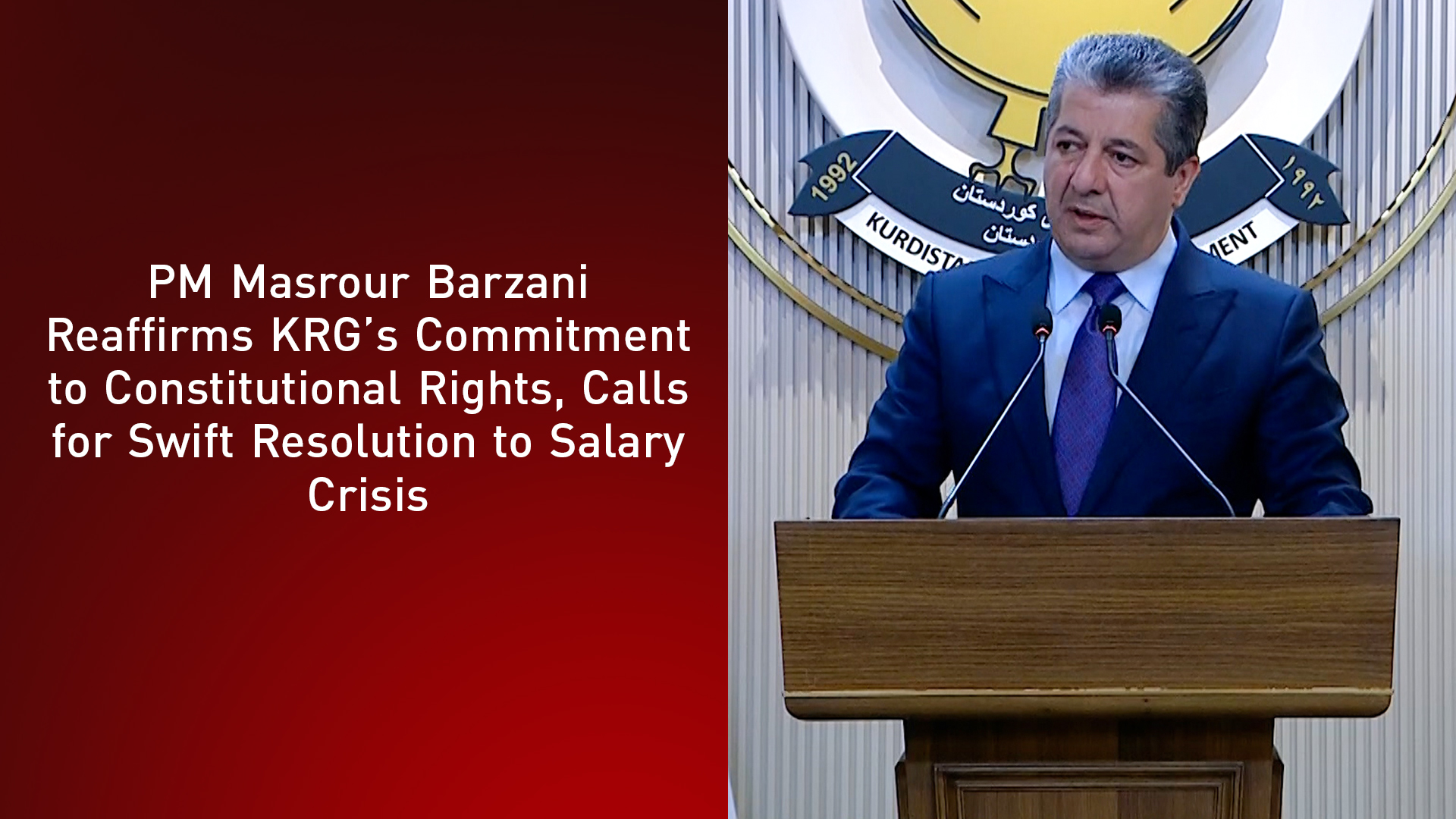PM Masrour Barzani Reaffirms KRG’s Commitment to Constitutional Rights, Calls for Swift Resolution to Salary Crisis
I spoke with both the head of Iraq’s Judiciary Council and the Prime Minister. They assured me that a high-level delegation will soon arrive in Erbil to hold genuine talks aimed at resolving the salary crisis.”

ERBIL (Kurdistan24) — Kurdistan Region Prime Minister Masrour Barzani on Wednesday addressed the public during a press conference following the weekly cabinet meeting, discussing the salary crisis, relations with Baghdad, the Iran-Israel war, and the broader geopolitical situation in the region.
Barzani began by expressing deep gratitude to the people of the Kurdistan Region, especially public sector employees, for their patience and resilience amid the ongoing salary crisis. “They have endured a great deal over the past two months,” he said. “Salaries were unlawfully withheld, which is unconstitutional. We firmly believe that the public employees' livelihoods should never be politicized or entangled with disputes between the Kurdistan Regional Government (KRG) and the federal government.”
The Prime Minister reiterated that the KRG would never give up the constitutional rights of the Kurdish people. “With God's help and the unwavering support of the people, I am confident we will overcome this crisis,” Barzani stated. “The strength of this government lies in the backing of its citizens, and that is what has enabled us to continue defending their rights.”
Barzani added that there hasn’t been a single day in recent months when his government has not worked toward resolving the salary issue. “We have maintained direct communication with federal authorities in Baghdad. Just yesterday, I spoke with both the head of Iraq’s Judiciary Council and the Prime Minister. They assured me that a high-level delegation will soon arrive in Erbil to hold genuine talks aimed at resolving the salary crisis.”
He emphasized that the visiting delegation is political and empowered to make decisions, not merely technical. “We welcome any real effort to solve this issue — our people deserve justice and stability,” he said.
Barzani assured citizens: “We share your pain. Whatever is within the government’s and my personal power, we will use it to ensure your rights are protected. I hope that within the coming days we will reach a positive outcome with Baghdad.”
Responding to a journalist's question, Prime Minister Barzani stated that: "If we do not reach an agreement with the Iraqi government to resolve the salary issue, with domestic revenue and reduced expenditures or in any other way, we will do what we can to ensure the rights and financial entitlements of the Kurdistan Region' people."
Oil Export Crisis and Baghdad's Economic Measures
Addressing the ongoing halt in Kurdish oil exports, Prime Minister Barzani criticized the federal government for failing to compensate the financial losses caused by blocking the KRG's oil sales. He noted that oil production in the Kurdistan Region has sharply declined as a result.
“The oil export problem is not just between Erbil and Baghdad — the exporting companies have legal rights too. Agreements must be made with them too to ensure fair treatment,” Barzani said.
He explained that a large portion of the currently produced oil is used domestically based on existing contracts. It is refined and distributed in local markets, covering fuel needs and contributing to power generation across the region.
Position on Iran-Israel Conflict
Touching on the recent Iran-Israel conflict, Barzani warned of the potential for the war to escalate across the entire region. “Thankfully, with U.S. involvement and the initiative of President Trump, a ceasefire was reached, and the conflict has de-escalated. This is in the interest of the entire region,” he said.
Barzani also praised Iraqi Prime Minister Mohammed Shia' al-Sudani and Foreign Minister Fuad Hussein for their diplomatic efforts to keep Iraq out of the confrontation. “As the Kurdistan Region, we have done our utmost to remain distant from this war and its consequences,” he stated.
He concluded with hope that the ceasefire would be the beginning of a broader peace process. “Instead of war and tension, let dialogue and economic revival lead the way for our region,” he said.
